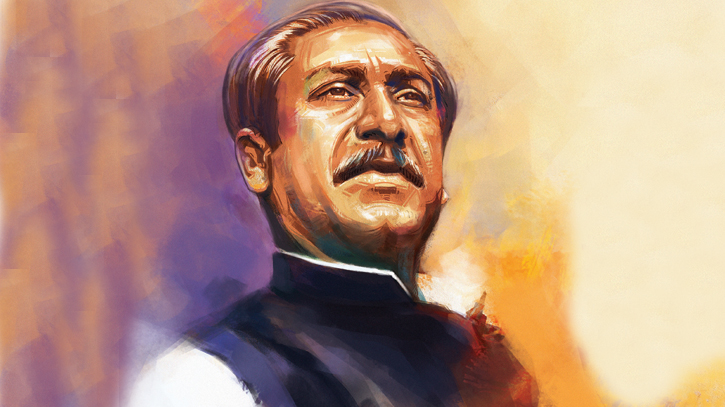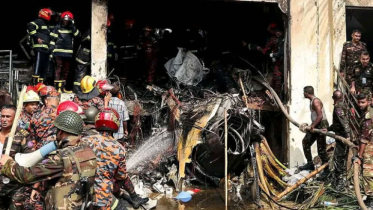
Photo : TDM
In the annals of history, there exists a night so dark, it haunts the collective memory of a nation.
On that fateful 15 August in 1975, Bangabandhu Sheikh Mujibur Rahman, the visionary architect of an independent Bangladesh, faced a harrowing encounter that would forever alter the course of the nation.
A group of ruthless conspirators, driven by their hunger for power, unleashed a torrent of violence, using 18 bullets to extinguish the life of the great leader. This chilling act reverberates through time, leaving a somber mark on the hearts of the Bengali people and serving as a stark reminder of the resilience that emerges from the face of tragedy.
In the hours leading to his untimely demise, Bangabandhu displayed great courage, confronting his assailants with a chilling inquiry: "I am President Sheikh Mujib. What is your intent? Where are you taking me?" These words, tragically cut short by a bullet, reveal a man of unwavering bravery in the face of adversity.
Indira Gandhi aptly captured the sentiment, saying, “I'm broken by the news of Sheikh Mujib's death. He was a great leader. His extraordinary heroism has been a source of inspiration for the people of Asia and Africa.”
The rumble of truck engines disrupted the evening quietness at Dhaka cantonment. The heavy-duty trucks, loaded with 105mm cannons, made their way from the southern end of the cantonment to the under-construction airport on the capital's edge. These ominous preparations signaled the tragic events about to unfold.
“The killers were able to murder Bangabandhu Sheikh Mujib, but they could not kill his dreams and ideals,” said Prime minister Sheikh Hasina, his daughter, carrying on his legacy.
Under the cover of darkness, rogue army officers, including Major Shariful Haque Dalim, Major Noor Chowdhury, Captain Mohammed Bazlul Huda, and Major Shahriar Rashid, gathered, preparing for a massacre that would forever put a scar Bangladesh's history. The calculated attack involved multiple targets, including President Mujib's residence in Dhanmondi, Minto Road, and the residence of Bangabandhu's nephew, Sheikh Fazlul Haq Moni.
As the clock struck past midnight, the operation's chilling details were disclosed, setting in motion a fateful mission that would alter the country's destiny forever. The killers moved forward, their actions synchronized with their plan. The tanks rumbled through the empty roads of Dhaka, converging on their designated targets.
The tragic outcome of this operation left Bangabandhu's residence, House 677 of Road 32, in turmoil. His family members, deep in slumber, including his wife Sheikh Fazilatunnesa Mujib, their sons Sheikh Kamal, Sheikh Jamal, and Sheikh Russell, were unsuspecting victims.
The unfolding events brought a morning darker than night. As the attackers made their move, Bangabandhu’s personal assistant AFM Mahitul Islam, awakened by telephone mechanic Abdul Matin, learned that President Mujib's relatives' houses were under attack.
Bangabandhu's inquiries, a plea for understanding, were met with violence. A bullet silenced the voice of the Father of the Nation, leaving a trail of bloodshed that spared no one, not even a 10-year-old boy or a pregnant woman, in one of the world's bloodiest political assassinations.
The night of August 14, 1975, saw the orchestrated movement of two Field Regiment vehicles, dragging 105mm cannons to the under-construction airport in Kurmitola for "training." Bengal Lancer T-54 tanks left their units, assembling a formidable force at the airport, a chilling sign of what was to come.
The details of this operation reveal the grim determination of those responsible, the calculated precision with which they carried out their plan. They succeeded in taking Bangabandhu's life, but they could not extinguish his dreams and ideals, as Sheikh Hasina's words so aptly remind us.
The tragic events of that night altered Bangladesh's trajectory, leaving scars that time can't erase. The bravery of Bangabandhu, his unwavering resolve in the face of adversity, and the resilience of a nation that refuses to forget continue to shape the legacy of Bangladesh.
Meanwhile, the nation is set to observe the National Mourning Day and 48th martyrdom anniversary of Father of the Nation Bangabandhu Sheikh Mujibur Rahman today with due respect and solemnity.
Bangabandhu and most of his family members were brutally killed by some disgruntled army men on that night.
Apart from Bangabandhu and his wife Bangamata Sheikh Fazilatun Nesha Mujib, 26 other people including their family members and relatives were killed that day, according to AL website.
The martyrs included Bangabandhu's eldest son Sheikh Kamal, second son Sheikh Jamal, two daughters-in-law Sultana Kamal and Parveen Jamal Rozi, youngest son 10-year-old Sheikh Russell, younger brother Sheikh Abu Nasser, nephew Sheikh Fazlul Haque Mani along with his pregnant wife Begum Arju Moni and Bangabandhu's brother-in-law Abdur Rab Serniabat. Bangabandhu's chief security officer Colonel Jamil Uddin Ahmad was also killed on the fateful night.
Father of the Nation's two daughters Sheikh Hasina, now Prime Minister, and Sheikh Rehana escaped the planned assassination as they were staying abroad.
TDM/SD








